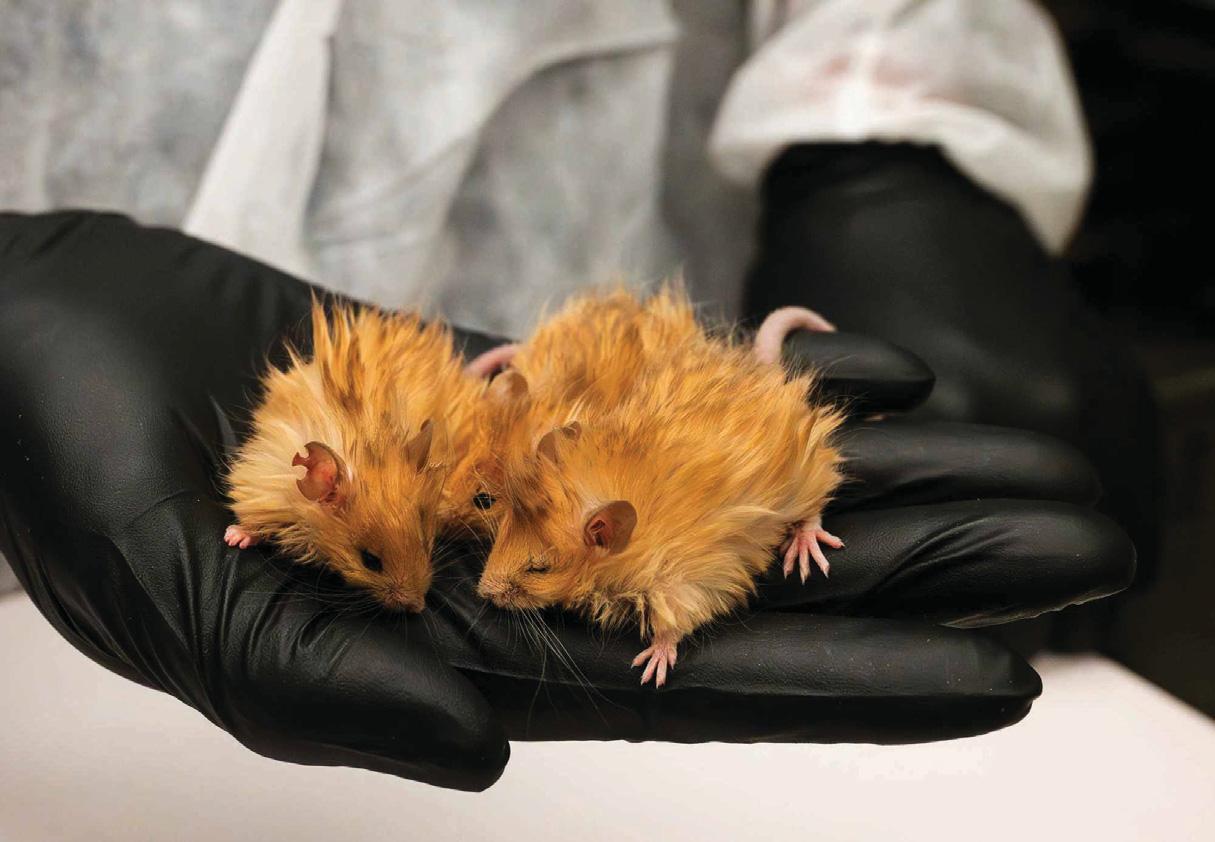Try GOLD - Free
Is creating a 'woolly mammoth mouse' a step too far for biotechnology?
BBC Science Focus
|March 2025
Are scientists so preoccupied with whether or not they could bring back mammoths, that they're not concerned with whether they should?

Colossal Biosciences, a US biotech start-up, has announced the birth of what it calls a “woolly mouse” – the world’s first animal genetically altered to express key genes from a woolly mammoth. The company says the luxuriously haired rodents are living proof that it’s making progress in its mission to resurrect the woolly mammoth from extinction within a matter of years.
To make the mice, scientists used the latest genetic technologies to introduce eight simultaneous edits to the genomes of laboratory mice. These include the addition of genes that cause its fur to grow up to three times longer than normal, and others that make the hairs wavy and golden. Other edits targeted genes associated with fat metabolism that are thought to have helped mammoths increase in size.
The mice are the result of years of painstaking work by scientists to reconstruct key parts of the mammoth genome. The last woolly mammoths are thought to have died around 3,000 years ago, and scientists have been piecing together bits of degraded mammoth DNA from remains between 3,500 and 1.2 million years old. This is the first time that some of the key genes identified through that work have been expressed in a living animal.
 MAMMOTH 2.0
MAMMOTH 2.0Colossal’s ambitious long-term plan is to add lots of these mammoth genes to embryos of modern-day elephants to create mammoth-like hybrids.
Despite its claims to be resurrecting the woolly mammoth, the original Mammuthus primigenius, with all its original genetic complexity and population diversity, isn’t being brought back to life. The creatures are more accurately described as “cold-resistant elephants”.
This story is from the March 2025 edition of BBC Science Focus.
Subscribe to Magzter GOLD to access thousands of curated premium stories, and 10,000+ magazines and newspapers.
Already a subscriber? Sign In
MORE STORIES FROM BBC Science Focus

BBC Science Focus
HOW UNLIKELY IS OUR UNIVERSE?
Our understanding of the Universe has revealed that its existence, and indeed our own, relies on a particular set of rules.
1 mins
December 2025

BBC Science Focus
DOES YOUR NAME AFFECT YOUR PERSONALITY?
Research is revealing that nominative determinism isn't as easy to dismiss as you might think
5 mins
December 2025

BBC Science Focus
HOW DIFFICULT WOULD IT BE TO FLY THROUGH THE ASTEROID BELT?
In the 1980 film Star Wars: The Empire Strikes Back, Han Solo and friends try to escape pursuing imperial forces by flying through an asteroid field. Droid C-3PO remarks, \"the odds of successfully navigating an asteroid field is approximately 3,720 to 1\". The scene depicts a chaotic, dense field of rocks swirling and spinning through space. This scenario has been played out many times in the cinema.
1 min
December 2025

BBC Science Focus
HOW CAN I BE MORE PERSUASIVE?
Most of us like to think we're rational people. If someone shows us evidence that we're wrong, we'll change our minds, right? Well, not necessarily, because it's not always that simple. Being wrong feels uncomfortable and sometimes threatening. That's why changing someone's mind is often much harder than it seems.
2 mins
December 2025

BBC Science Focus
This bizarre optical illusion could teach us how animals think
By seeing which animals fall for a classic visual trick, scientists are uncovering how different brains make sense of the world
1 mins
December 2025

BBC Science Focus
LIFE AT THE PARTY
The secret that keeps the superagers so sprightly could be socialising
3 mins
December 2025

BBC Science Focus
AIN'T NO MOUNTAIN HIGH ENOUGH
Could an exoskeleton help you scale every peak with ease? Ezzy Pearson straps on some cyborg enhancements to find out
5 mins
December 2025

BBC Science Focus
A slice across the sky
The green flash slicing through the skies in this shot is a fireball.
1 min
December 2025

BBC Science Focus
TB is surging. Should we be worried?
Cases of the world's deadliest infection are climbing in the UK and US. Why is tuberculosis returning and how do we fight back?
4 mins
December 2025

BBC Science Focus
I survived the worst fire in the history of space exploration and had to keep it a secret
Astronaut Jerry Linenger opens up about one of the worst accidents in space, and the cover-up that followed
1 mins
December 2025
Listen
Translate
Change font size
